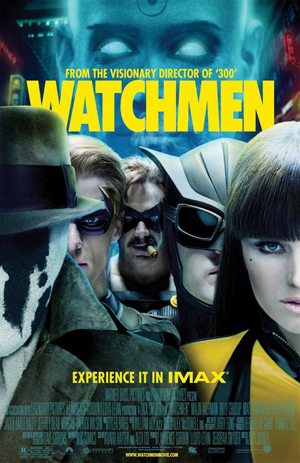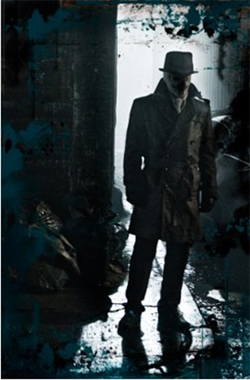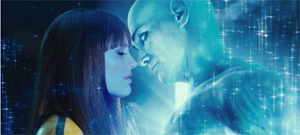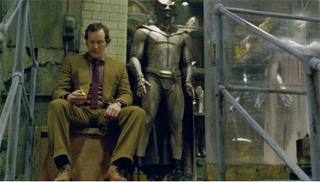|
Watchmen
The times, they are a-changin', and so must
elements of Watchmen when bringing it to film. Fundamentally
and occasionally slavishly, Director Zack Snyder leaves
the skeleton of the classic graphic novel alone, but also
fleshes it out with modern movie language, for better and
for worse. Does this make Snyder the "visionary" ads tout
him as? Perhaps not, but he has delivered a film worth thinking
about, as much for his own touches as for the weight of
the source material.
Let's get the most controversial change
out of the way. Yes, Snyder and screenwriters David Hayter
and Alex Tse alter the villain's master plan from the original,
which upon reflection makes that character a lot more overtly
villainous. However, it also makes a little more sense,
bringing another character to a more logical (and heroic)
conclusion.
Of course, Watchmen is more about
ripping apart those heroic tropes, and Snyder's film has
no qualms about upping the ante there. Where Dave Gibbons'
original art gave us hints of violence frozen in a panel,
Snyder offers sickening bone-crunching, spatters of blood
all over the place. Speeding up, slowing down, sometimes
holding, the action becomes completely up to date, even
though the film remains set in an alternate 1985.
It would be nice to think that, too, is
intended as commentary on audience expectations, but it's
more likely the ultra-violence is just meant as a sop to
those who require such things from an R rated movie.
And that's where things break down a bit
- the nagging feeling that every now and then, Snyder can't
help but aim for the cheap seats. He makes a few ridiculously
obvious music choices and has a tendency to throw in real
world pop culture references.
That sits at odds with the care he's taken
to make even Richard Nixon look like a Dave Gibbons caricature,
and not the real man. Snyder keeps accidentally taking us
out of the world he's building by reminding us of our own
- when one of the points of the story is that for reasons
unknown, the presence of actual masked adventurers has utterly
changed the culture. Yet I admit, and it maddens me, that
some people may very well need those anchors.
As it is, Snyder has to remind us of a
time gone crazy. For a lot of target moviegoers, that's
a hazy era at best, yet absolutely the right choice for
the story. The script adds a few direct scenes with Nixon
that might not have been out of place in Dr. Strangelove;
if everybody's crazy with fear or bravado, putting on latex
- spandex just has no place - isn't really much more an
insane decision.
Unless
you're going out and beating up criminals, perhaps. There
the heart of the graphic novel remains beating strongly.
Laurie Jupiter (Malin Akerman) and Dan Drieberg (a perfectly
cast Patrick Wilson) might joke about the masochistic criminal
Captain Chaos, but they are no less screwed up when it takes
getting back into costume to cure impotence.
Of course, they are relatively normal when
compared to Rorschach (Jackie Earle Haley) and Dr. Manhattan
(Billy Crudup), two heroes who have become their identities
so completely that the world may hang in the balance.
Because Snyder went for mostly talented
actors, he earns a pass on the more jarring spins he has
put on things. Haley's performance, though obviously closely
modeled on the work of Alan Moore, still manages to add
a little ambivalence to scenes, as well as sympathy. It's
an acting job that makes us wonder if we quite caught -
or flat out understood - everything about it.
In a much calmer way, Crudup allows us
to understand the complexity of Dr. Manhattan's detachment
from humanity. Aided by CG work that occasionally makes
it seem like a universe is alive inside him, Crudup delineates
a believable arc for a man on his way to deity.
The
more grounded characters are mostly on target as well. Matthew
Goode's Adrian Veidt seems too slight to be the ultimate
specimen of humanity, and he wears his outrageous ego like
a mask in and of itself. There's just something slightly
Eurodisco about him that feels out of place, and that's
not just because of his obvious weakness for hanging out
at Studio 54 or his incredibly bad blond wig.
The
weakest link may be Akerman, though in the book Laurie has
the hard edge and misplaced anger that the actress imbues
her with. We just don't get a chance to see any other side,
and that may be as much a problem with the massive scope
of the story leaving things out. One subplot involving the
first Nite-Owl (Stephen McHattie) starts and never comes
back around to fruition, though it must surely be in the
massive already promised Director's Cut.
Those are things that only fans of the
graphic novel would know anyway. What stands on screen works,
though occasionally the pacing has fits and starts due to
the moments where the film pays too much attention to its
source. Action stops dead for a rumination on Dr. Manhattan's
origins, which worked for me, but might not for other audiences.
Of course, that's just the way the book worked.
So
it's a little bit simplified. What remains still has a lot
of scope, and should provoke a lot of discussion. In truth,
like with The Dark Knight,
it feels really good to walk out of a so-called superhero
movie and be arguing about ideas sparked by the film, not
just whether or not certain moments were cool or stupid.
Like its source, Watchmen has us wondering, and is
worth revisiting.
And if you don't buy that, then the graphic
novel remains unchanged, and you should read that again,
too.
|









